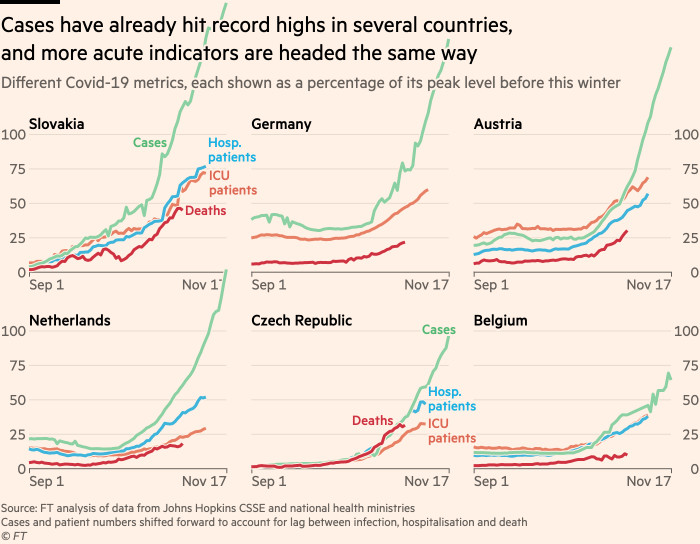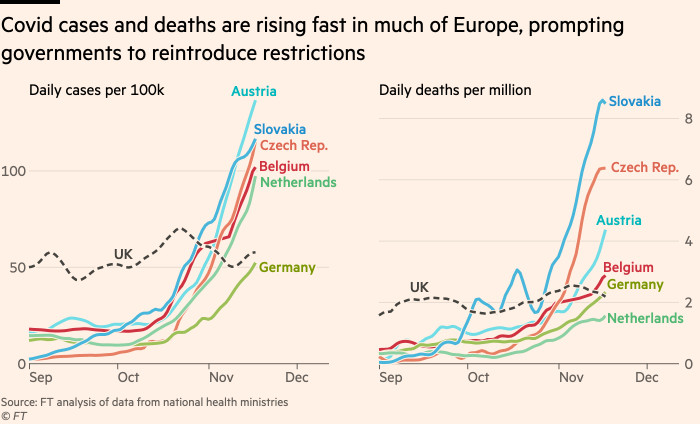Angela Merkel said anyone in Germany who has yet to be vaccinated against Covid-19 will have to show a negative test result to be allowed to go to work, as authorities scrambled to deal with a huge surge in new coronavirus infections.
“We are in the middle of the fourth wave, trying to deal with a dramatic level of infection in Germany,” the chancellor said, adding that it was essential to “put a brake on the exponential increase” in new infections.
Merkel and the leaders of Germany’s 16 federal states met on Thursday as the number of new infections in the country reached record highs. According to figures from the Robert Koch Institute, the country’s main public health agency, the number of new cases in the past 24 hours stood at 65,371.
“The situation is highly dramatic and it’s now a question of acting fast, or acting consistently and monitoring better,” she said.
The leaders agreed to introduce a new system of incremental restrictions tied to the level of hospital admissions.
Germany is one of several European countries that are introducing new restrictions to battle a fourth wave of infections. In Austria, pressure is mounting on the federal government to impose a nationwide lockdown after the states of Upper Austria and Salzburg ordered all residents to stay at home regardless of their vaccination status.
Slovakia and the Czech Republic, which both recorded their worst daily infection figures since the start of the pandemic on Wednesday, set out new measures on Thursday. Belgium has imposed a four-day homeworking rule to come into force next week.
Thomas Stelzer, governor of Upper Austria, urged the federal government to implement the measures, which include shutting non-essential shops and hospitality venues, nationwide.
“We have very, very little room for manoeuvre,” he said on Thursday. “If there isn’t a full federal lockdown by Monday, then we will go ahead with a lockdown lasting for several weeks in Upper Austria and the neighbouring state of Salzburg.”
State governors will meet the federal government on Friday to discuss the proposals for a nationwide lockdown. The leader of the opposition Social Democrats, Pamela Rendi-Wagner, said she supported the plan.
Many believe a short lockdown is the best option in order to allow the winter sports season to go ahead with relative normality from December. Skiing and snowboarding attract an estimated 600,000 tourists to Austria annually. According to Dutch bank ING, in the winter the sports account for up to 4 per cent of gross domestic product.
Austria registered a seven-day average of 136 new Covid-19 cases per 100,000 residents on Wednesday, one of the highest rates in Europe, according to Johns Hopkins University. A day earlier it recorded a new high of 15,609 new daily cases. The country has operated a controversial lockdown against the unvaccinated, with severe financial penalties enforced against rule-breakers.

Despite widespread availability, about a quarter of Austrians over the age of 12 have yet to receive any dose of a Covid-19 vaccine. Scepticism about the vaccine’s efficacy and opposition to its enforced administration are widespread in Austria and other European countries.
Slovakia’s Prime Minister Eduard Heger said he would introduce a three-week “lockdown of the unvaccinated” from Monday. Only people who have been vaccinated or recovered from coronavirus in the past six months will be allowed to enter non-essential shops, restaurants, sports facilities and public gatherings.
The Czech Republic announced similar measures, banning unvaccinated people who have not had Covid-19 in the past six months from restaurants and public gatherings.
Slovakia and the Czech Republic have a seven-day average of new cases per 100,000 people of 116 and 115 respectively, according to Johns Hopkins. Both countries have lower vaccination rates than the EU average, with just 58 per cent of Czechs and 43 per cent of Slovaks fully inoculated.

In Belgium, employees will be obliged to work from home for four days a week until December 12, when the requirement will be relaxed to three days.
“We are taking measures everyone can follow, so we can avoid another lockdown,” Belgium’s Prime Minister Alexander De Croo said late on Wednesday when announcing the measures, which also include mask mandates indoors and in crowded outdoor spaces.
Belgium has experienced a steady rise in infections and hospital admissions, despite having 75 per cent of its population fully vaccinated. The country aims to finalise its booster campaign by March or April next year.
Additional reporting by John Burn-Murdoch
For all the latest Business News Click Here
For the latest news and updates, follow us on Google News.
